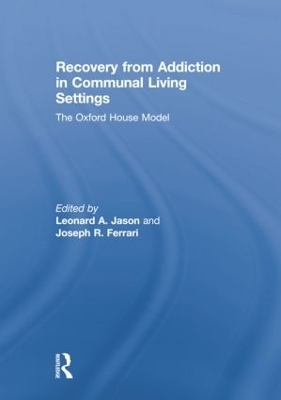
Recovery from Addiction in Communal Living Settings
Routledge (Verlag)
978-1-138-86758-1 (ISBN)
This book was published as a special issue in the Journal of Groups in Addiction and Recovery.
Research on treatment outcome for addictive disorders indicates that a variety of interventions are effective. However, the progress clients make in treatment frequently is undermined by the lack of an alcohol and drug free living environment supporting sustained recovery. This book suggests that treatment providers have not paid sufficient attention to the social environments where clients live after residential treatment or while attending outpatient programs. It also describes the need for alcohol and drug free living environments.
We then review the history of communal living for recovering addicts and alcoholics and provide concrete examples of the Oxford House model, which is a widespread communal living option for over 10,000 recovering persons in the US. The structure and philosophy of Oxford Houses are presented along with recent outcome studies providing support for their effectiveness.
This book was published as a special issue in the Journal of Groups in Addiction and Recovery.
Leonard A. Jason is the Director of the Center for Community Research and a Professor of Psychology at DePaul University. His research interests include recovery homes and addiction, tobacco prevention interventions, and chronic fatigue syndrome. Joseph R. Ferrari, Ph.D. is the Vincent Distinguished Professor of Psychology at DePaul University and his interests include; chronic procrastination, self-handicapping and attribution, attitude change and persuasion, community-based service-learning ∧ volunteerism, community Building and sense of community, recovery from addiction, and behavior analysis in the community.
1. Introduction: Using the Oxford House Model to Examine 12-Step Recovery Oxford House Effects on the Internal Life of the Addict 2. Communal-Living Settings for Adults Recovering from Substance Abuse 3. Oxford House and Alcoholics Anonymous: The Impact of Two Mutual-Help Models on Abstinence 4. The Role of Self-Regulation in Abstinence Maintenance: Effects of Communal Living on Self-Regulation Oxford House Effects in the Interpersonal Realm 5. Hope and Substance Abuse Recovery: The Impact of Agency and Pathways within an Abstinent Communal-Living Setting 6. Self-Reports of Substance Abusers: The Impact of Social Desirability on Social Network Variables 7. Sense of Community within Oxford House Recovery Housing: Impact of Resident Age and Income 8. Abstinence Social Support: The Impact of Children in Oxford House Oxford House Effects on the External Community 9. A Longitudinal Analysis of Criminal and Aggressive Behaviors Among a National Sample of Adults in Mutual-Help Recovery Homes 10. The Relationship of Gender and Ethnicity to Employment Among Adults Residing in Communal-Living Recovery Homes 11. The Neighborhood Environments of Mutual-Help Recovery Houses: Comparisons by Perceived Socioeconomic Status 12. Measuring In-Group and Out-Group Helping in Communal Living: Helping and Substance Abuse Recovery
| Verlagsort | London |
|---|---|
| Sprache | englisch |
| Maße | 174 x 246 mm |
| Gewicht | 272 g |
| Themenwelt | Sachbuch/Ratgeber ► Gesundheit / Leben / Psychologie |
| Geisteswissenschaften ► Psychologie ► Allgemeine Psychologie | |
| Geisteswissenschaften ► Psychologie ► Sozialpsychologie | |
| Medizin / Pharmazie ► Gesundheitswesen | |
| Medizin / Pharmazie ► Medizinische Fachgebiete ► Psychiatrie / Psychotherapie | |
| Medizin / Pharmazie ► Medizinische Fachgebiete ► Suchtkrankheiten | |
| Sozialwissenschaften ► Pädagogik ► Sozialpädagogik | |
| Sozialwissenschaften ► Soziologie | |
| ISBN-10 | 1-138-86758-6 / 1138867586 |
| ISBN-13 | 978-1-138-86758-1 / 9781138867581 |
| Zustand | Neuware |
| Haben Sie eine Frage zum Produkt? |
aus dem Bereich


